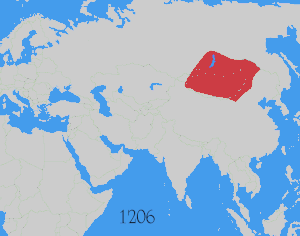
Mongol Empire from Wikipedia
Where did Genghis Khan's Wealth Come
From?
To
comprehend Genghis Khan's wealth you must understand the full extent of his
ambition. In order to do this it would be helpful to know the chronology of his
wars. To look at this in today's terms his conquests would span 30 nations and 3+billion people.
Above
is a map of the burgeoning Mongol Empire from 1206 to 1294. Although Genghis
Khan died in 1227 and the size of the then Mongol occupied lands is shown, he
and his generals raided and plundered kingdoms well beyond that enormous
territory. It must be realized it was he who first gave Mongols the taste for
conquest and his empire that expanded for decades after his passing.
As
was mentioned earlier in order to consolidate power and create the Mongol
Confederation it was necessary for Genghis Khan to unite by conquest. He did
this by defeating the tribes such as the Merkits and the Naimans. Once this was
done he set about securing new sources of food and land for his drought plagued
people.
Genghis
Khan knew his two main rivals were Western Xia and the Jin. He wagered that the
stronger Jin would deny Western Xia any support if it was attacked. Thus he
invaded the Western Xia Dynasty of the Tangut Empire. His bet had turned out to be a good one. He had conquered the Tanguts by 1209.
Although
the Tangut population was considered nomadic it had realized the importance of
irrigation channels and had good grasslands and large cattle herds as a result.
Iron, woolen products, pottery, and porcelain were its primary economic
resources.
Equally
important was that Western Xia had within its borders the Hexi Corridor, a vital
trade route connecting North China and Central Asia at that time.
The
people of Western Xia had made strides in literature, architecture, the arts and music. All
of this was assimilated into the Mongol culture. In my next post I will discuss
Genghis Khan’s war with the Jin.

No comments:
Post a Comment